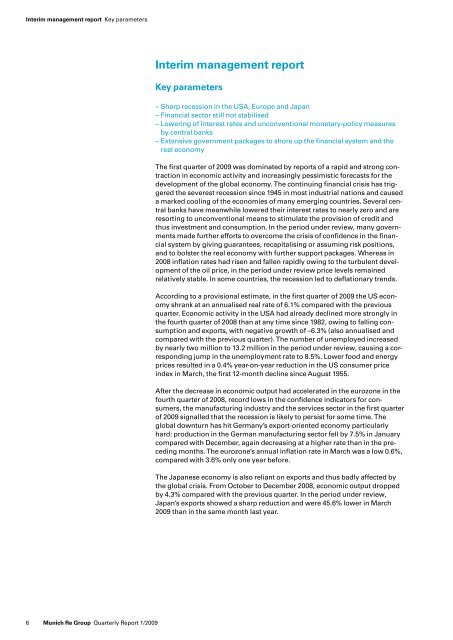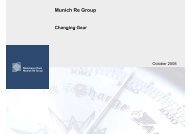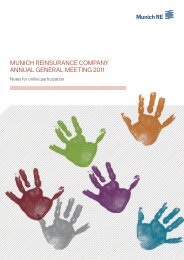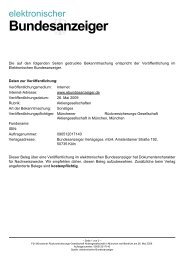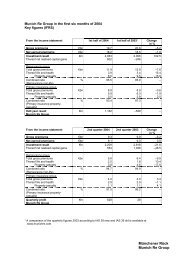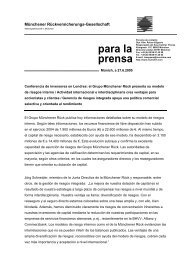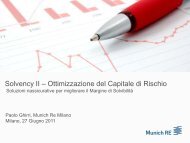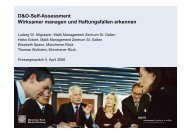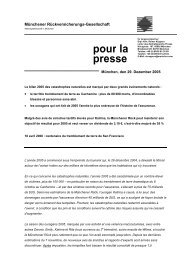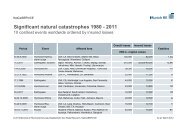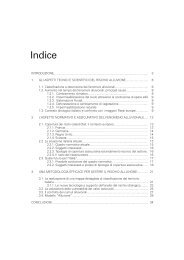Quarterly Report 1/2009 - Munich Re Group
Quarterly Report 1/2009 - Munich Re Group
Quarterly Report 1/2009 - Munich Re Group
Create successful ePaper yourself
Turn your PDF publications into a flip-book with our unique Google optimized e-Paper software.
Interim management report Key parameters<br />
6 <strong>Munich</strong> <strong>Re</strong> <strong>Group</strong> <strong>Quarterly</strong> <strong><strong>Re</strong>port</strong> 1/<strong>2009</strong><br />
Interim management report<br />
Key parameters<br />
– Sharp recession in the USA, Europe and Japan<br />
– Financial sector still not stabilised<br />
– Lowering of interest rates and unconventional monetary-policy measures<br />
by central banks<br />
– Extensive government packages to shore up the financial system and the<br />
real economy<br />
The first quarter of <strong>2009</strong> was dominated by reports of a rapid and strong contraction<br />
in economic activity and increasingly pessimistic forecasts for the<br />
development of the global economy. The continuing financial crisis has triggered<br />
the severest recession since 1945 in most industrial nations and caused<br />
a marked cooling of the economies of many emerging countries. Several central<br />
banks have meanwhile lowered their interest rates to nearly zero and are<br />
resorting to unconventional means to stimulate the provision of credit and<br />
thus investment and consumption. In the period under review, many governments<br />
made further efforts to overcome the crisis of confidence in the financial<br />
system by giving guarantees, recapitalising or assuming risk positions,<br />
and to bolster the real economy with further support packages. Whereas in<br />
2008 inflation rates had risen and fallen rapidly owing to the turbulent development<br />
of the oil price, in the period under review price levels remained<br />
relatively stable. In some countries, the recession led to deflationary trends.<br />
According to a provisional estimate, in the first quarter of <strong>2009</strong> the US economy<br />
shrank at an annualised real rate of 6.1% compared with the previous<br />
quarter. Economic activity in the USA had already declined more strongly in<br />
the fourth quarter of 2008 than at any time since 1982, owing to falling consumption<br />
and exports, with negative growth of –6.3% (also annualised and<br />
compared with the previous quarter). The number of unemployed increased<br />
by nearly two million to 13.2 million in the period under review, causing a corresponding<br />
jump in the unemployment rate to 8.5%. Lower food and energy<br />
prices resulted in a 0.4% year-on-year reduction in the US consumer price<br />
index in March, the first 12-month decline since August 1955.<br />
After the decrease in economic output had accelerated in the eurozone in the<br />
fourth quarter of 2008, record lows in the confidence indicators for consumers,<br />
the manufacturing industry and the services sector in the first quar ter<br />
of <strong>2009</strong> signalled that the recession is likely to persist for some time. The<br />
global downturn has hit Germany’s export-oriented economy particularly<br />
hard: production in the German manufacturing sector fell by 7.5% in January<br />
compared with December, again decreasing at a higher rate than in the preceding<br />
months. The eurozone’s annual inflation rate in March was a low 0.6%,<br />
compared with 3.6% only one year before.<br />
The Japanese economy is also reliant on exports and thus badly affected by<br />
the global crisis. From October to December 2008, economic output dropped<br />
by 4.3% compared with the previous quarter. In the period under review,<br />
Japan’s exports showed a sharp reduction and were 45.6% lower in March<br />
<strong>2009</strong> than in the same month last year.


